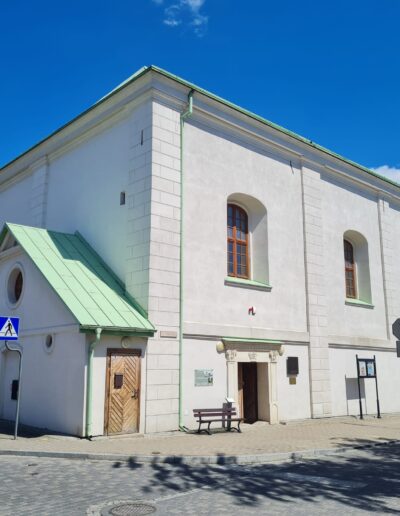Adaptive Reuse of the Prewar East European Synagogues
Ruthy Cohen
Master Erfgoedstudies
2023 — 2024
onderzoek
promotor
Yonca Erkan
Adaptive Reuse of the Prewar East European Synagogues
The thesis explores the complex issue of adaptive reuse of former synagogues in Eastern Europe, with a focus on their educational value. The research examines the current debate about the adaptive reuse of synagogues, differentiating it from similair efforts involving other religious structures.”Swietokrzyski Shtetl” in Chmielnik, Poland, is presented as case study of a former synagogue transformed into an educational space that honours Jewish heritage while fostering intercultural dialogue.
The thesis explores the complex issue of adaptive reuse of former synagogues in Eastern Europe, with a particular focus on their educational value. Through an historical overview, the research delves into the Jewish life that once thrived in Eastern Europe, particularly in Poland, and how the tragic events of the Holocaust left a void, leading to deterioration of many Jewish heritage sites. The study highlights the challenges faced in the preservation and reuse of these synagogues, considering both religious perspectives and the architectural and cultural implications.
The research examines the current debate on the adaptive reuse of synagogues, differentiating it from similar efforts involving other religious structures. A key aspect of this debate is the tension between preserving the sacred nature of these buildings and their reintegration into community life for educational purposes. It presents “Swietokrzyski Shtetl” in Chmielnik, Poland, which exemplifies how a former synagogue can be transformed into an educational space that honours Jewish heritage while fostering intercultural dialogue.
This case study is p significant because it represents a successful, locally driven initiative to adaptive reuse a synagogue in a small town with limited resources. The project underscores the potential for former synagogues to serve as educational tools that commemorate the tragic history of Jewish communities and celebrate their cultural and social contributions. The thesis concludes by emphasising the importance of strategic planning and collaboration among stakeholders to ensure that these sites are preserved and utilised in ways that respect their historical significance and serve contemporary educational needs.
Contact
Ruthy Cohen
cohenruthy96@gmail.com

